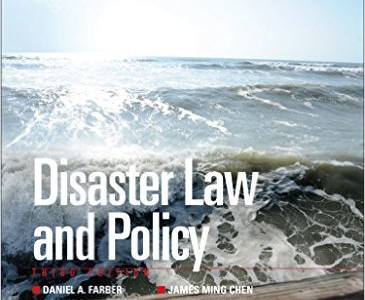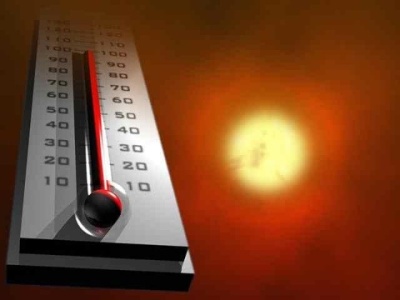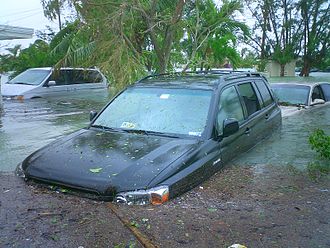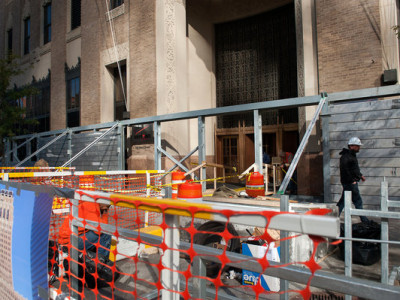Disaster Law
Disaster Law and Policy
A new textbook on the emerging field of Disaster Law.
I’m delighted to announce the publication of the third edition of Disaster Law and Policy. Although I might not normally use this blog to promote a new book, I’d like to think in this case this is more than just shameless self-promotion. That’s for two reasons: the lion’s share of the credit for the improvements …
Continue reading “Disaster Law and Policy”
CONTINUE READINGLegal Responses to the Santa Barbara Refugio Oil Spill
Exploring potential penalties and damages
Last Tuesday, a 24-inch underground oil pipeline on the beautiful Santa Barbara County coastline burst for reasons as of yet unknown. Over the course of several hours, an estimated 101,000 gallons of crude oil spilled down a storm drain, on the shoreline, and into the Pacific Ocean. As of late last week, oil had spread …
Continue reading “Legal Responses to the Santa Barbara Refugio Oil Spill”
CONTINUE READINGLos Angeles Heat Waves, Electricity Use and Climate Change
It is 102 degrees in Los Angeles as I write this. Not in the San Fernando Valley or in the communities east of Los Angeles whose temperatures are regularly several degrees higher but in downtown Los Angeles. We’re in record heat territory and way above historical averages. But temperatures aren’t the only records that are …
Continue reading “Los Angeles Heat Waves, Electricity Use and Climate Change”
CONTINUE READINGClimate Change Adaptation Strategy: Can California Do More?
Is Increased Reliance on the Public Trust Doctrine an Essential Part of Effective State Adaptation Policy?
I often tell students in my Climate Change Law and Policy course that adaptation–that is, how we can best adapt to the unavoidable impacts of climate change–is the poor stepchild of the debate over greenhouse gas emissions and climate change. By that I mean that climate change mitigation (i.e., how to reduce greenhouse gas emissions) generates far more …
Continue reading “Climate Change Adaptation Strategy: Can California Do More?”
CONTINUE READINGAnd Now For Something Completely Different: Chemical Facility Safety?
For the past few days we have all been focused—justifiably—on the EPA’s proposed carbon rule for power plants. But that’s not all EPA and the rest of the federal government have been up to recently. Today a federal interagency working group established under Executive Order 13650, Improving Chemical Facility Safety and Security (“EO 13650”) issued …
Continue reading “And Now For Something Completely Different: Chemical Facility Safety?”
CONTINUE READINGInsurance for Climate Disasters
Nobel-prize winning economist Robert Schiller has a New York Times op-ed about the need for insurance against risks of climate change. Speaking of the latest U.S. climate assessment, he writes: After discussing how to mitigate the coming dangers, the report says, “Commercially available mechanisms such as insurance can also play a role in providing protection against …
Continue reading “Insurance for Climate Disasters”
CONTINUE READINGIn Harm’s Way
Millions of people are in the path of rising seas. The time for action is now.
The NY Times has run a series of articles in the past few days dealing with disaster issues. Taken together, they highlight the urgency of government action to protect populations in harm’s way. One article dealt generally with the threat posed by sea level rise. Miami is something of a poster-child for these problems, given its …
Continue reading “In Harm’s Way”
CONTINUE READINGPrivate Flood Protection
Private flood control is no substitute for government action.
Last week, the NY Times had a story about Verizon’s new flood barrier for its Wall Street building, which is a designated landmark. On one level, it’s a pretty cool project — a portable barrier designed to keep out the water during a hundred-year storm (plus 2-feet for storm surge plus an extra foot to …
Continue reading “Private Flood Protection”
CONTINUE READINGBenevolent Paternalism or “Tough Love”?: Two Approaches for Adapting to Climate Change
Homeowners in coastal Queens, NY are outraged that their home insurance rates are going to rise sharply. Some are threatening not to buy such insurance. Such individuals must be betting that they will be “too big to fail” and that some future benevolent government official will bail them out with FEMA $ when the next …
CONTINUE READINGAdaptation to Increased Fire Risk in the South West
Read this WSJ article and you will see some “small ball” optimism about adapting to increased fire risk. Permit me to quote one wise retired professor; “Paul Ohlenbusch, a 73-year-old former professor, lives in a retirement community north of Austin, Texas, an area plagued by drought for several years. To protect his home from possible …
Continue reading “Adaptation to Increased Fire Risk in the South West”
CONTINUE READING









